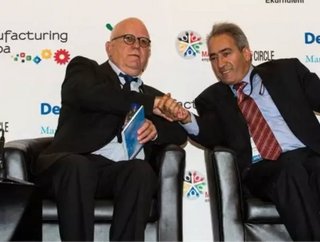Smart Manufacturing for Economic Growth in South Africa

South Africa’s economy has been given a theoretical boost via its burgeoning manufacturing industry following the inaugural Manufacturing Indaba event in May.
Taking place at Emperors Palace in Ekurhuleni, the gathering was organised to bring together business owners, industry leaders, government officials, capital providers and professional experts to assess the hidden fiscal gems currently being under-utilised within manufacturing, science and innovation.
Esteemed partners comprising Deloitte SA, the City of Ekurhuleni, Productivity SA, Proudly SA, SEIFSA, NCPC-SA and Manufacturing Circle have subsequently produced a Declaration of Intent to ensure that the country delves deeper into its resources to produce the next generation of manufacturing talent; for the benefit of the industry, and for the country as a whole.
Declaration of intent
The two-day event’s location in Ekurhleni, in the Gauteng region of the country, was especially pivotal in the overall plans emanating from the discussions, with the region earmarked as a key area of a potential revival, through an industrial development zone.
City of Ekurhuleni has taken a deliberate trajectory towards the development of an Aerotropolis, a first of its kind in Africa. The Aerotropolis planning lies at the heart of the Cities next phase of globalisation and development, with the manufacturing sector playing an important part in this development. Meanwhile, Gauteng’s MEC for the Department of Economic Development, Mxolisi Xayiya, addressed delegates on the “Proposed Growth and the Roadmap for Developing Manufacturing in Gauteng”.
“One thing I’ve found in common amongst those who attended the Manufacturing Indaba is that everyone – from government to the private sector - is looking to the manufacturing sector as that next big growth frontier,” said Ekurhuleni’s HOD for Economic Development, Caiphus Chauke.
Executive Mayor of the City of Ekurhuleni, Cllr Mondli Gungubele added: “The City of Ekurhuleni’s participation in this Inaugural Manufacturing Indaba has been important for our prospects of developing the region and our plans to revive the manufacturing sector.
“I was quite impressed with the turnout at the inaugural Manufacturing Indaba and there is significant scope for further developments. The discussions were robust and there was a clear demonstration that everyone understands the importance of the role manufacturing has to play in the fight in turning the economy of the country around and improving the general living standard of all our people.”
Apart from being endorsed by the City of Ekurhuleni, the Manufacturing Indaba was also supported by strategic knowledge partner, Deloitte and Productivity SA, as well as being endorsed by Manufacturing Circle, and hosted by Siyenza who is looking to build on its successes in hosting the Africa Energy Indaba, the continent’s premier energy event.
“We are very pleased with the launch of the Manufacturing Indaba because we see the growth potential for job creation and skills development of this sector,” said Liz Hart, Managing Director of Siyenza.
“The success of our nation depends on a strong and innovative manufacturing base with Deloitte on board as our knowledge partner we believe we can leverage this powerful collaboration of strategic partners to promote prosperity through manufacturing, science and innovation.”
Localisation as a global trend
As the country’s second largest economic sector, manufacturing did experience a slight year-on-year rise in 2013, but the general consensus is that more needs to be done to eliminate the obstacles that local manufacturers have typically had to face to remain competitive with counterparts in neighbouring countries.
Drivers such as innovation, costs of labour and materials, supplier networks, economy and trade, infrastructure and government investments are all seen as key instigators in bridging this gap and helping the country climb out of the doldrums through enhanced education and security.
Localisation as a global trend was discussed in detail while other key topics addressed included upcoming challenges to the industry, the opportunities for SMEs, incentives to ensure foreign investment, access to finance and general growth strategies in enhancing a culture of productivity.
No stone unturned
As well as formulating potential solutions, the idea behind Manufacturing Indaba has also been to raise awareness to some key groups in South Africa; namely policy makers, private equity investors, international exporters and suppliers, and academic bodies and institutions.
This has seemingly been achieved via a focus on three separate ‘clusters’, targeting various sectors of industry.
Cluster one consisted of a more qualitative focus on the potential of metals fabrication, transport equipment, oil and gas, energy and agro processing while cluster two comprised automotive sectors as well as chemicals, textiles, paper, packaging and biofuels.
More advanced manufacturing engrained into the likes of aerospace, defence and nuclear sectors were also accounted for in the third ‘cluster’ with no stone being left unturned as part of the overall strategy.
The hope now is that the country, and subsequently the wider continent, will enjoy the same successful outcomes from the Manufacturing Indaba as have been seen in its Energy equivalent.
One thing is certain though, with the clout of the partners behind the initiative, the aim of moving the industry forward over the next five years, and making manufacturing a more attractive prospect for locals in Africa, could not be in safer hands.
- Smart Manufacturing & Factories of the Future at HitachiSmart Manufacturing
- A Deep Dive into MES Functionality at InforSmart Manufacturing
- Microsoft's Smart Manufacturing Innovation & PTC PartnershipSmart Manufacturing
- Microsoft's Smart Manufacturing Innovation & PTC PartnershipSmart Manufacturing






